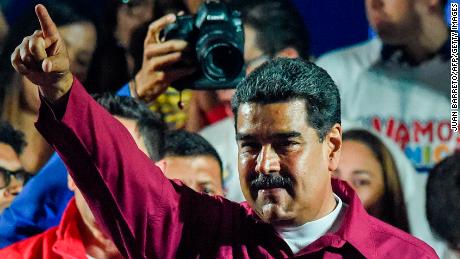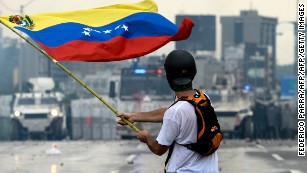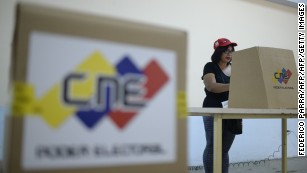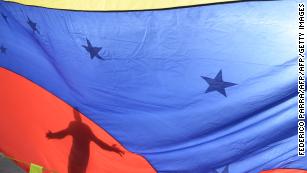Venezuelan President Maduro wins re-election
President Nicolas Maduro was declared the winner of Venezuela's presidential election Sunday, in a vote that has been criticized both inside and outside of the country.
Maduro celebrated his re-election during a victory rally in central Caracas Sunday night, after the country's National Electoral Council president declared him the winner.
"I am a better prepared president and human being right now," he said to a cheering crowd outside Miraflores presidential palace. "You trusted in me and I will respond. Thank you for giving me 68% of those votes."
Maduro, who first took office in 2013 after his predecessor and mentor Hugo Chavez died, will govern Venezuela for another six-year term. The term officially begins in January 2019 and ends in 2025.
"This is my fourth victory in a row," Maduro said. "This is our [party's] 22nd victory in 19 years -- we have prevailed."
Amid widespread economic anxiety, Maduro also said the country will enter a "new phase" and fight against "the mafias" to revamp the economy.
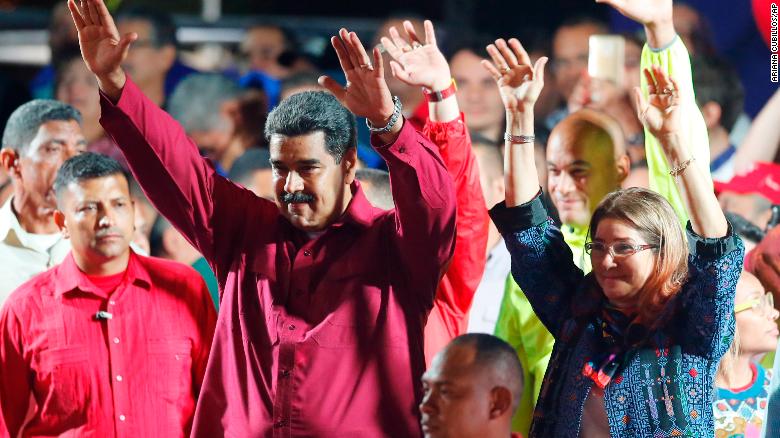
Venezuela's President Nicolas Maduro and his wife Cilia Flores wave to supporters at the presidential palace in Caracas.
The main opposition coalition boycotted the election, but Maduro was not without challengers.
Maduro's chief rival for the presidency was Henri Falcon, a former state governor and onetime loyalist of the ruling party who broke ranks in 2010. About 5.8 million votes went to Maduro and Falcon came in second with 1.8 million votes, according to National Electoral Council president Tibisay Lucena. These figures were based on 92.6% of the tallied votes.
Lucena said 46% of Venezuela's voting population participated in the election.
On Sunday, Falcon cited hundreds of complaints of election violations. Election officials said they would address the claims.
Many countries, including the United States, have called the election a "sham" and said they would not recognize the results of Sunday's vote.
5 reasons why we should care about the crisis in Venezuela
Maduro said he would be open to dialogue with the "empire" of the United States.
"If the government of the United States wants to dialogue at some point, I am open to dialogue. If the other right wing countries that are supported by the US want to dialogue, I am open to that," he said.
Amid allegations that the election process lacked legitimacy, Maduro had said earlier in a Sunday news conference: "There has been a fierce campaign by the government of Donald Trump. In the United States there has been a fierce pressure to try to besmirch the Venezuelan elections -- and they couldn't."
US Secretary of State Mike Pompeo said on Sunday that he was watching the election closely. "Sham elections change nothing. We need Venezuelan people running this country ... a nation with so much to offer the world," he said on Twitter.
'Nothing is normal'
The country has endured political tumult and economic misery, including food and medicine shortages, and hyperinflation.
"Nothing is normal," said citizen Carmen Herrera. "The little bit of money that we earn is not enough to buy even half dozen eggs."
Venezuelans head to the polls amid international outcry
"I would like to see a change because at this rate we're not going to get anywhere."
Because of the deteriorating situation, an estimated 1.6 million people fled the country between 2015 and 2017, according to the International Organization for Migration.
Under Hugo Chavez, the country turned toward socialism. Many Venezuelans saw him as the hero of the poor. Before he died, Chavez picked Maduro as his successor, which helped put Maduro over the top in the 2013 presidential election.
Once he took power, Maduro kept up Chavez's practices such as huge welfare programs and price controls for most goods, including food.
Venezuela holds the world's largest supply of crude oil -- which once seemed like an endless gusher of cash for the government.
Plummeting oil prices crashed the country's economy in 2016. It has since completely collapsed, and the country now finds itself in the middle of a financial crisis. The International Monetary Fund expects that inflation in Venezuela will reach 13,000% in 2018.
Falcon was once a Chavez supporter. In 2010, he broke with the ruling party and has been a vocal critic of the government in recent years. He believes the way out of the financial crisis is the dollarization of the country -- pinning the country's economy on the US dollar.
Casting ballots
Many of those who boycotted the election said they believed it was rigged. The event is an afterthought for so many citizens battling despair, fatigue and economic insecurity. People say they are preoccupied with getting their next meal or leaving the country.
Marco Rubio: It's time to hasten Maduro's exit from power
"Both my family and I are very undecided about whether we're going to vote," said Betty Fernandez before the election.
Falcon -- who cast a ballot and spoke to reporters at a polling station -- said this is not the time to be complacent. "The hunger situation, the misery, the uncontrolled political situation that our country lives is truly alarming."
He said there have been no less than 350 reports of election violations. He urged security forces to address the issues.
Lucena, president of the National Electoral Council, is following up.
"We haven't had any significant incident so far, we don't have any knowledge of any aggression made or of any greater difficulty during the process," said Lucena.
CNN staff said one polling station was very quiet and the turnout wasn't very high at that spot.
Ecuador's former President Rafael Correa -- who has a good relationship with Maduro -- was in Caracas monitoring the elections and cited a healthy turnout.
"In a few hours early morning, there was already participation at 30%, which illuminates a big participation at the end of the working day."
News Courtesy: www.cnn.com

